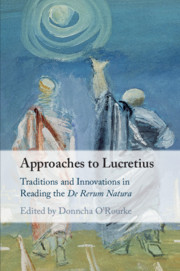Book contents
- Approaches to Lucretius
- Approaches to Lucretius
- Copyright page
- Contents
- Figures
- Notes on Contributors
- Preface
- Abbreviations
- Introduction
- Part I The Text
- Part II Lucretius and his Readers
- Part III The Word and the World
- Chapter 5 Infinity, Enclosure and False Closure in Lucretius’ De Rerum Natura
- Chapter 6 Lucretian Echoes
- Chapter 7 Saussure’s cahiers and Lucretius’ elementa: A Reconsideration of the Letters–Atoms Analogy
- Part IV Literary and Philosophical Sources
- Part V Worldviews
- Works Cited
- Index Locorum
- Index Rerum
Chapter 5 - Infinity, Enclosure and False Closure in Lucretius’ De Rerum Natura
from Part III - The Word and the World
Published online by Cambridge University Press: 25 June 2020
- Approaches to Lucretius
- Approaches to Lucretius
- Copyright page
- Contents
- Figures
- Notes on Contributors
- Preface
- Abbreviations
- Introduction
- Part I The Text
- Part II Lucretius and his Readers
- Part III The Word and the World
- Chapter 5 Infinity, Enclosure and False Closure in Lucretius’ De Rerum Natura
- Chapter 6 Lucretian Echoes
- Chapter 7 Saussure’s cahiers and Lucretius’ elementa: A Reconsideration of the Letters–Atoms Analogy
- Part IV Literary and Philosophical Sources
- Part V Worldviews
- Works Cited
- Index Locorum
- Index Rerum
Summary
The idea that the universe is infinite in size is central to the Epicurean system. Infinity, however, is also a concept that, in the history of philosophical, scientific and artistic discussion before and after Lucretius, has defied explanation, engendered paradox, and stimulated the romantic sensibility. This chapter looks at the strategies, philosophical and literary, deployed by Lucretius to achieve closure on this inherently open topic. Co-ordinate with the relationships of analogy and complementarity between the text of the DRN and the nature of the universe it describes, the poem’s poetics of closure and enclosure, on the one hand, and of non-closure or ‘false closure’, on the other, express and enact the infinity of the universe conceived both as all-encompassing and as open-ended. These rival conceptions of infinity are modeled throughout the poem, and especially in Epicurus’ triumph of the mind (1.62–79) and Lucretius’ reworking of a thought-experiment attributed to Archytas of Tarentum (1.951–83). Taken together, they bring out the tension, or complementarity, in Lucretius between the totalizing scientist who prescribes an intellectual panacea and the sublime poet who reaches into the beyond.
Keywords
- Type
- Chapter
- Information
- Approaches to LucretiusTraditions and Innovations in Reading the <I>De Rerum Natura</I>, pp. 103 - 123Publisher: Cambridge University PressPrint publication year: 2020
- 1
- Cited by

